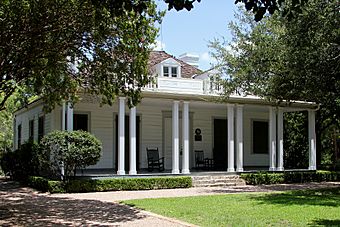French Legation facts for kids
|
French Legation
|
|

The French Legation now serves as a period museum and host to a variety of community events.
|
|
| Location | 802 San Marcos St. Austin, Texas, USA |
|---|---|
| Built | 1841 |
| NRHP reference No. | 69000213 |
Quick facts for kids Significant dates |
|
| Added to NRHP | November 25, 1969 |
The French Legation is a very old and important building in Austin, Texas. It was built in 1841. This building was once the official home for the French government in the new Republic of Texas.
It is one of the oldest wooden buildings still standing in Austin. Because it's so important, the French Legation is listed on the National Register of Historic Places. It's also recognized as a special landmark by Texas and the City of Austin.
For many years, the Daughters of the Republic of Texas took care of the building. They opened it as a museum. In 2017, the Texas Historical Commission began managing the site.
Contents
History of the French Legation
France Recognizes Texas
After Texas became independent from Mexico in 1836, France was one of the first countries to officially recognize it. The United States was the other. This recognition was made official with a special agreement in 1839.
France then sent a diplomat named Alphonse Dubois de Saligny to Texas. He was called a "chargé d'affaires." His job was to represent the King of France, Louis Philippe I, in the new Republic of Texas.
Building the Legation
The French Legation building was finished in 1841. It was built about half a mile east of Austin's city center. While his new home was being built, Dubois de Saligny rented a cabin downtown. He held fancy dinner parties there.
He also worked with Texas leaders to encourage French people to move to Texas.
The Pig War Incident
Dubois de Saligny's time in Austin was not always peaceful. He had a big disagreement with a local innkeeper named Richard Bullock. This conflict even led to a fight in 1841, known as the Pig War.
Dubois de Saligny's helper killed some pigs belonging to Bullock that were causing trouble. In return, Bullock attacked Dubois de Saligny's helper.
Leaving Austin
In 1842, the capital of Texas was temporarily moved to Washington-on-the-Brazos. This happened during the Texas Archive War, a dispute over government records. Because of this, Dubois de Saligny's house was left empty.
The French government called Dubois de Saligny back to France in 1846. This was when Texas joined the United States.
Later Owners and the Museum
After Dubois de Saligny left, the mansion had several owners. First, John Mary Odin, a Bishop from Galveston, lived there. Then, Moseley Baker, a hero from the Texas Revolution, bought it in 1847.
Dr. Joseph W. Robertson later bought the property from Baker. His family lived there for many generations, until 1940. During the time Dubois de Saligny and the Robertson family lived there, they had enslaved people who worked on the property.
In 1945, the State of Texas bought the site from the Robertson family's descendants. The state then put the property in the care of the Daughters of the Republic of Texas (DRT).
The DRT opened the French Legation Museum in 1949. They worked to restore the building and its grounds to look like they did in the past. The museum opened to the public on April 5, 1956.
Protecting the View
From the front porch of the French Legation, you can see the Texas State Capitol. This view is so special that it's protected by state and local laws. Since 1983, no tall buildings can be built that would block this important view.
Since the mid-1990s, the museum staff has worked to include the local East Austin community in its programs. They want to share the history of the French Legation with everyone.
 | Roy Wilkins |
 | John Lewis |
 | Linda Carol Brown |



